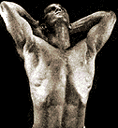Part One in a Six-Part Series

by Alicia Potter
Once, women worried about their figures while men scarfed pizza and beer with abandon. Then came Soloflex ads, male anorexia, and... plastic calves? John Updike once compared the male body to a bank account: as long as it's healthy, a man doesn't think much about it. Clearly John Updike never met Emanuel Ward. Ward has the physique of a star sprinter. His biceps bulge; his calves curve; under his green T-shirt, his stomach no doubt ripples. Yet last summer the 27-year-old Ward found himself fretting: how would he look in a swimsuit? Maybe not as buff as his buddies, he thought, vowing to step up his gym regimen. "I didn't want to be ashamed," he says. Not a typical guy thing to say, right? Think again. Being a man these days seems, well, an awful lot like being a woman. For men, more than ever, looks count. In Vogue and Men's Health alike, modern-day Adonises sell everything from protein powder to Armani cologne. They've got washboard abs, silky skin, nipples so erect they cast shadows. The male torso reigns as the decade's most powerful "crossover image" (appealing to men, women, gays, and straights alike), reports Peter Arnell of the New York advertising agency the Arnell Group. "It's kind of sad, but sometimes I see a guy on TV who's buff," Ward says, "and if I haven't been working out, I think, Wow! I better get back to the gym." He admits a Hanes underwear ad usually does the trick. If this is gender equality, then the turning of the tables is not without a surprising, and potentially harmful, set of side effects. As men become more body-conscious, and as advertisers become more shameless about objectifying the male physique, men are acquiring problems formerly associated with women: eating disorders, body obsessions, low physical self-esteem. One body-image study found that 45 percent of men were dissatisfied with their physiques; women were only slightly less satisfied at 55 percent. Some women, like Gwynne Reynolds, a 28-year-old marketing executive, say it's about time. "I think it's only fair that men get a taste of what it's like to be us," she says. Meanwhile, millions of guys on StairMasters are pondering what it means to be a man. How else to explain the success of the movie The Full Monty, a 90-minute riff on the crisis of the male self-image? The British comedy, about six laid-off steelworkers who put on a strip show despite their considerable physical flaws, has already raked in about $80 million worldwide. Yes, The Full Monty was funny, but it revealed more than just flesh. "You'd better pray that women are more understanding about us," one of the film's characters says. "Anti-wrinkle cream there is, anti-fat bastard cream there is not." This article originally appeared in The Boston Phoenix. Part Two: Adonises in Underwear — the New Male Beauty Ideal |








